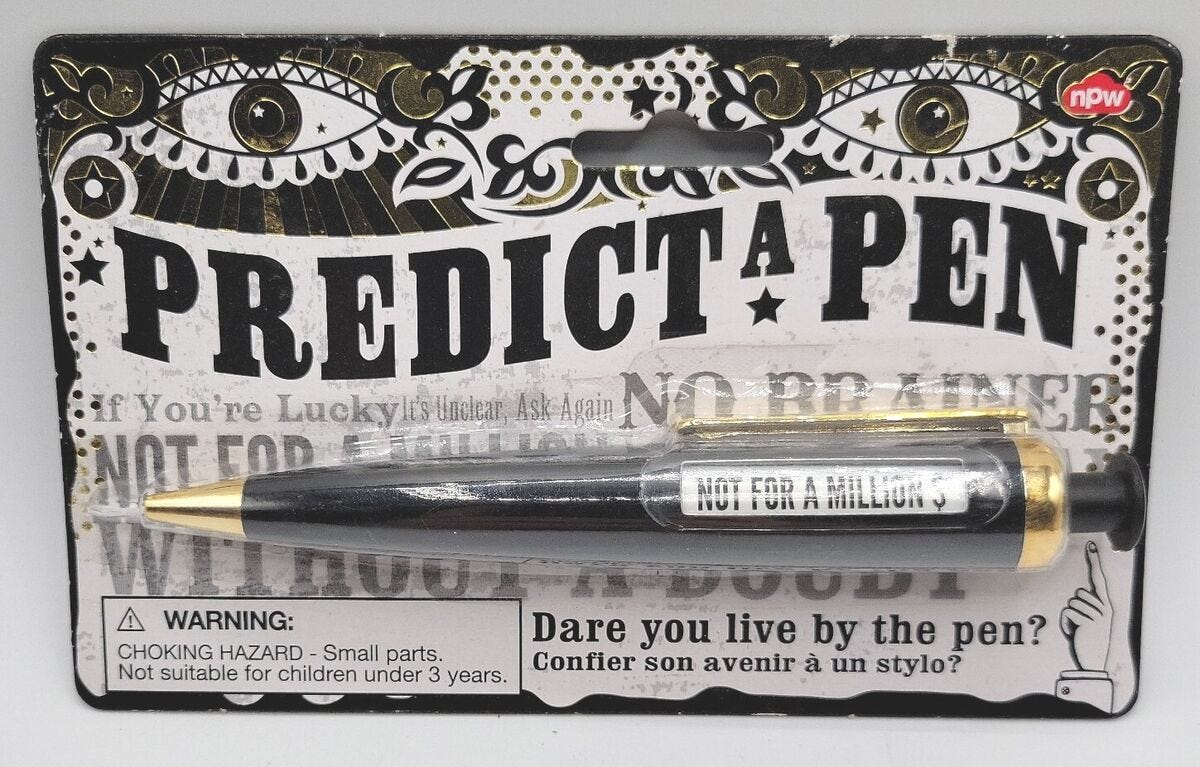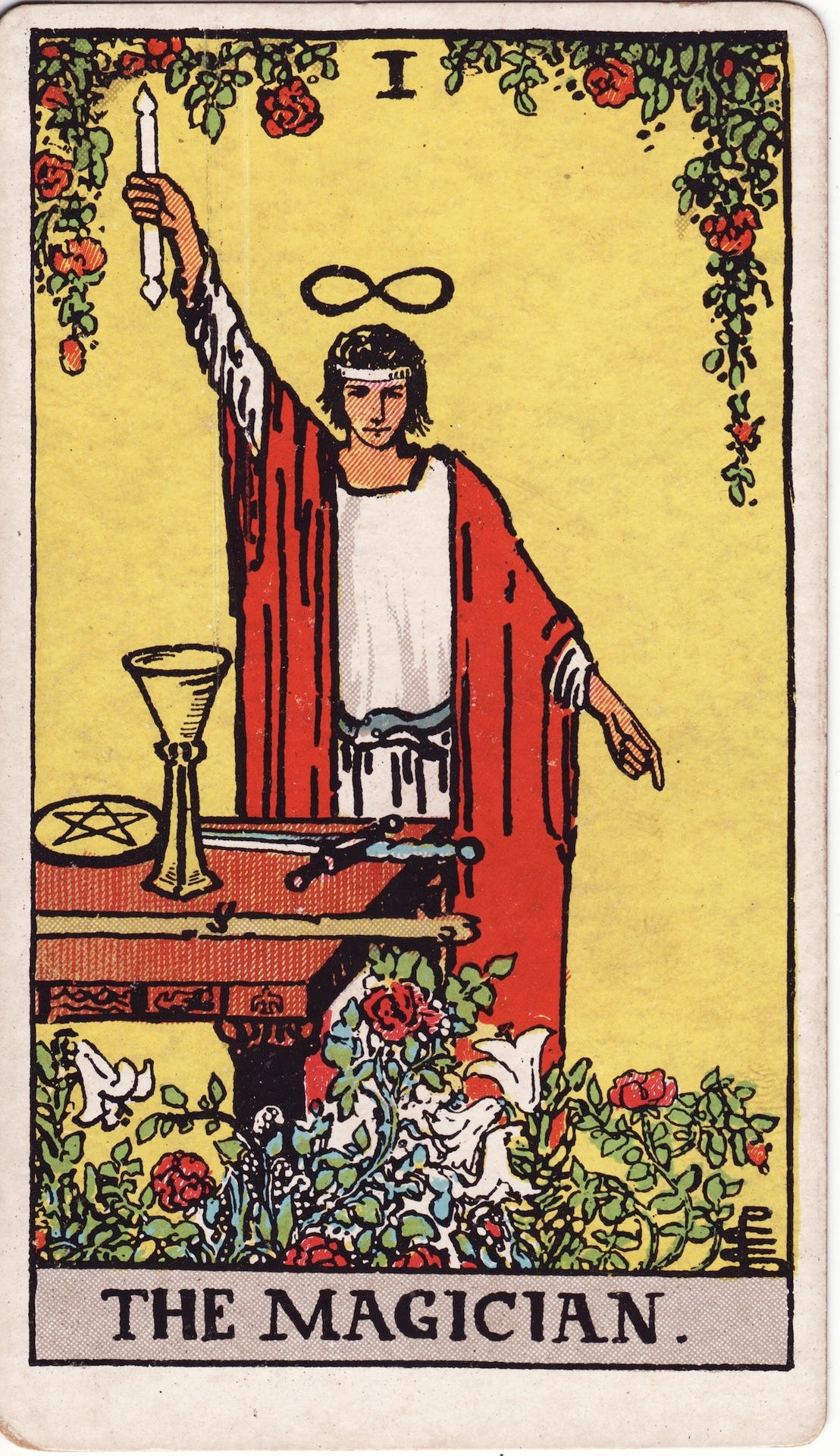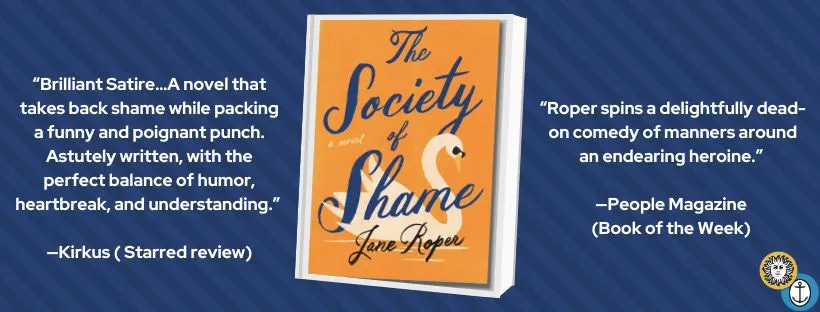Before I jump into this post, I just want to say thank you to the many, many women—some friends, some strangers—who commented or reached out after my last post to tell me to ask my doctor about HRT and other remedies for hot flashes. I did, in fact, talk to my doctor, and she suggested I try doing an estradiol patch, and holy crap, within a couple of days, the hot flashes were GONE. I expect that over the next few weeks, I will also regain the skin elasticity, energy, and optimism of a woman half my age. Stay tuned!
In the meantime, let’s talk tarot.
First, let me say that I pretty much only believe in woo-woo stuff like tarot cards when they’re working in my favor.
By which I mean: If I look at my horoscope or open a fortune cookie (the one I was drawn to, of course), and its advice applies perfectly—PERFECTLY!—to my current situation, or speaks to something I very much want to be true, I can’t help thinking that even though it’s probably just a coincidence, or confirmation bias, maybe, just maybe, the universe is trying to tell me something.
On the other hand, if my horoscope is completely irrelevant (I’m not hoping for a hot new romance this month, stars and planets, but thanks), or the fortune cookie says something useless like “you are admired by your peers,” I think, well, of course, because horoscopes and fortune cookies are bullshit.
Same deal with this fortune telling pen that a friend gave me when a novel of mine—the one I wrote before The Society of Shame—was out on submission.
Whenever the pen landed on a good outcome (“Without a doubt”) I would take it as a sign that, yes, I was CLEARLY going to get a book deal! But if the pen landed on a bad outcome (“No way”) this meant that I needed to focus harder on the question and spin again, because apparently the universe / pen didn’t catch what I was thinking the first time. And if it was still a bad response, well, fortune-telling pens are bullshit anyway.
(Sadly, the novel whose sale I was attempting to predict with a pen never was published. I did not use the pen when The Society of Shame went out on submission. It seems to have worked out well.)
Anyway. I suspect my brand of semi-woo-woo-ness is pretty common. (Anyone else?) My most rational self thinks “predictions” and “signs,” are a matter of us seeing what we want to see, or hearing what we want to hear—or maybe what we know deep down that we need to hear. And yet…
Which brings me to the tarot card I pulled.
This happened last weekend at Grubstreet’s The Muse and the Marketplace—a fabulous writing and publishing conference that I’ve had the honor of teaching at a number of times, including this year. While I was there, I attended a session called “Tarot for Writers,” run by my dear friends Jenna Blum and Erin Almond, both tarot enthusiasts. (In addition to being phenomenal writers)
During the presentation, I asked them (nicely!) what their thoughts were on the confirmation bias thing. Don’t we find ways to make the cards we draw—whose meanings are complex, and subject to interpretation—apply to our circumstances in a wishful thinking sort of way?
Their wise answer was that, essentially, it doesn’t really matter. If you find reassurance or hope in the cards, or if they help you confirm something you already know, and nudge you toward trusting your intuition, then hey, why not go with it?
At the end of a session, we were invited to draw one of the cards fanned out on a table, while thinking of a question pertaining to our writing. My question was “What do I need to know about my main character?”
Because here’s the thing. As I’ve been working on my new novel, I’ve been struggling to ignore some of the voices in my head—the ones that love to creep in and sow doubt and self-consciousness when I’m writing.
They’re the voices of my writing professors from Iowa, telling me that what I’m writing is trite and frivolous and un-literary. They’re the voices of critics saying, “a disappointment—her previous novel was much better.” And lately, most insidiously, they’re the voices of theoretical, future one- and two-star reviewers saying, “I hate the main character! She’s so unlikeable!”
My friends, I try very hard not to read my Amazon and Goodreads reviews, for the sake of my tender heart. I really do. But sometimes, like most authors, I cave. And “the main character was unlikeable” comes up frequently negative reviews of The Society of Shame. (And a lot of other novels, for that matter—especially ones written by women.)
Indeed, the protagonist of The Society of Shame, Kathleen, is quite flawed. She makes a lot of bad decisions, and loses sight of her principles and priorities as she becomes increasingly famous. This is, well, kind of the point.
Personally, I love stories about “unlikeable” characters—even deeply unlikeable ones who never realize the error of their ways as Kathleen does. Give me Tom Ripley and Scarlett O’Hara and Tracy Flick! Give me Don Draper and all four Roy siblings! Give me your serial killers and mean girls and con artists and “Karens”! For me, the question isn’t whether I like a character, but whether I find them, and their story, compelling.
But those kinds of protagonists aren’t for everyone. In fact, people’s (especially women’s) intolerance for unlikeable characters (especially female ones) is a frequent topic of conversation in the literary world. And, well, the world at large. (Hence this podcast and this ironic content warning.)
The main character of my new novel is, well, complicated. While she has redeeming qualities, she’s also impulsive and competitive and obsessive. She has a mean streak. On some deep level she knows she’s a mess, but when the novel begins, she’s in denial.
I’m having a shit-ton of fun writing this character’s story. And I like to think plenty of readers will enjoy reading her story, even if they don’t necessarily want to have a beer with her. So why am I worried about the people who will find her too “unlikeable” to stomach? Rationally, I know that no book is for everyone. Rationally, I know that it is not my job to please every reader. I am not required to be a “likeable” author! I am not required to write “nice”!
But that doesn’t stop the voices from nosing their way in and getting in the way of my forward progress on my draft.
So when I pulled a tarot card last weekend, I was hoping for some kind of clarity on who my main character should or shouldn’t be. Do I need to “soften” her? Make her more likeable? Am I on the wrong track?
Here’s the card I got.
When Jenna saw I’d drawn this card, she waved me over and whispered This is the best card for writers!! I always hope I’ll get it!
For those of you who, like me, don’t know bupkus about tarot cards, the Magician is what’s known as a “Major Arcana” card, meaning it pertains to major life lessons / ongoing themes in your life. The Magician, specifically, is about “manifestation, resourcefulness, power, and inspired action.” Its message is that “you have all the tools and abilities you need to be successful.”
When reversed—that is, if it’s upside down when you draw it, which it was for me—it can be interpreted to mean that you need to reconnect with your personal power. You need to "avoid being manipulated by outside voices” or “letting self-doubt get in the way of the opportunities available to you.”
So, did I interpret this card as a sign that I need to shut out those “she’s not likeable enough” voices, trust in my creative powers and instincts, and keep writing the character I want to write, as she’s revealing herself to me? Did I interpret it to mean that this book will (eventually) be good, and I need to trust in my tools and abilities, and not worry about how it will be received?
You bet your buttocks I did.
And maybe no matter what card I’d gotten, I would have found a way to make it “tell” me what I needed to hear at this juncture in my writing process. And/or maybe if I’d pulled a card whose meaning seemed completely irrelevant and inscrutable, I would have chalked it up to tarot cards being bullshit.
But what actually happened was that I drew The Magician. And I am choosing to take it to heart.
All posts on Jane’s Calamity are free and publicly available, but writing is how I make my living. If you enjoy my work, please consider buying my book or upgrading to a paid subscription. Thank you!





How funny that you wrote about this. I love tarot woo-woo and just wrote a piece for my Thriving Creative newsletter about connecting it with creativity! *Cue spooky music* Discovered a couple of books on connecting tarot with creativity and writing during the research for it, Story Arcana by Caroline Donohue and The Creative Tarot by Jessa Crispin. Excited to dive in and get more ideas!
This sounds like so much fun - and I'm glad you are sticking with your character as is, because she's great. Also, I need me some tarot.